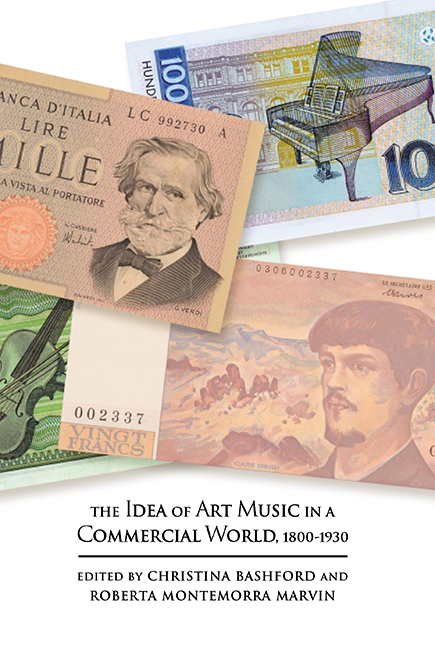Book contents
- Frontmatter
- Contents
- List of Figures
- List of Tables
- Notes on Contributors
- Acknowledgements
- A Note on Translations
- Bibliographic Abbreviations
- Introduction: The Idea of Art Music in a Commercial World
- PART I PUBLISHERS
- PART II PERSONALITIES
- PART III INSTRUMENTS
- PART IV REPERTOIRES
- PART V SETTINGS
- Index
- Music in Society and Culture
9 - Read All About It! Ancient Greek Music Hits American Newspapers, 1875–1938
Published online by Cambridge University Press: 27 May 2021
- Frontmatter
- Contents
- List of Figures
- List of Tables
- Notes on Contributors
- Acknowledgements
- A Note on Translations
- Bibliographic Abbreviations
- Introduction: The Idea of Art Music in a Commercial World
- PART I PUBLISHERS
- PART II PERSONALITIES
- PART III INSTRUMENTS
- PART IV REPERTOIRES
- PART V SETTINGS
- Index
- Music in Society and Culture
Summary
THE process of popularizing and commercializing ancient Greek music in the United States began in the 1870s, and by the late 1920s and 1930s, a number of publications as well as theatrical and radio performances had made a limited but credible impact on popular culture. What makes this process particularly interesting is that within the parameters of the history of Western music, ancient Greek music had until 1893 remained stubbornly arcane and widely misunderstood and misrepresented. That ultimately by the end of our period of study there were a number of public performances and commercial applications of ancient Greek music testifies to the powerful economic and commercial forces that accelerated during the latter third of the nineteenth century and the first third of the twentieth. But the recovery, study and publication of several ancient Greek musical texts had provided a new impetus for scholars to share their findings with fellow academics in both print and performance venues, and then the press found these to be inherently fascinating and continued to report developments to the public at large in national and local newspapers around the country, thereby helping to create the market for commercialization.
Because newspaper reports, announcements and reviews were so instrumental in creating and sustaining this small, unique market, the bulk of the data mined for this study required a search that would have been relatively difficult until a few years ago. The development of Proquest's digitized newspaper database has made focused searches of major American (and English) newspaper archives much more practicable within research library networks, as has the Library of Congress's website Chronicling America (www.chroniclingamerica.loc. gov). The emergence of publicly marketed, online newspaper archives like newspaperarchive.com and genealogybank.com has made available a variety of corpora containing searchable local newspapers. Together these contemporary resources allow scholars researching popular culture to delve into a period that produced and preserved sufficient amounts of traditional newspaper coverage to support the chronological survey presented in this study, which therefore claims to be neither comprehensive nor complete. Perhaps resources in the near and distant future will yield richer details about individual performances.
- Type
- Chapter
- Information
- The Idea of Art Music in a Commercial World, 1800-1930 , pp. 202 - 222Publisher: Boydell & BrewerPrint publication year: 2016
- 1
- Cited by

